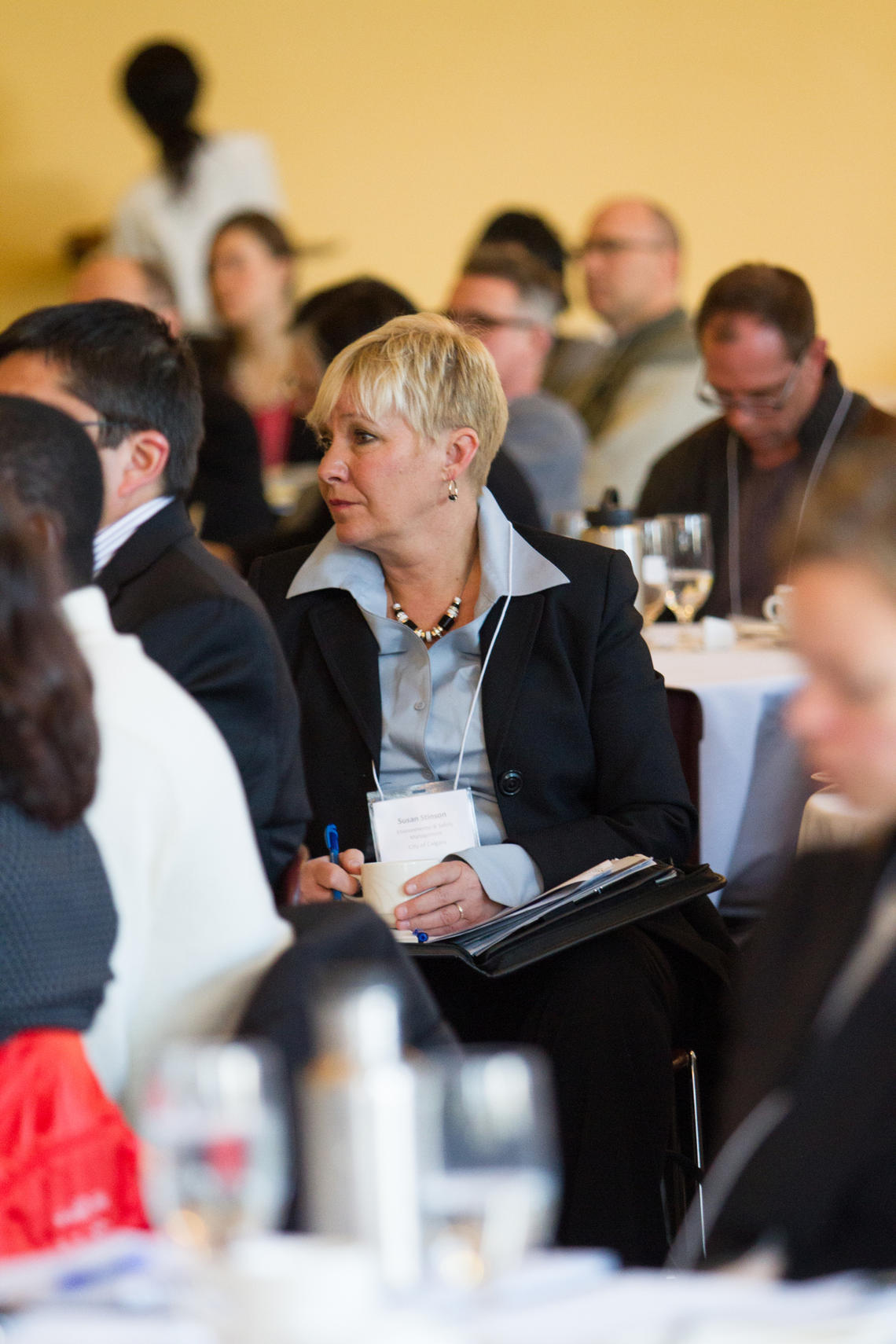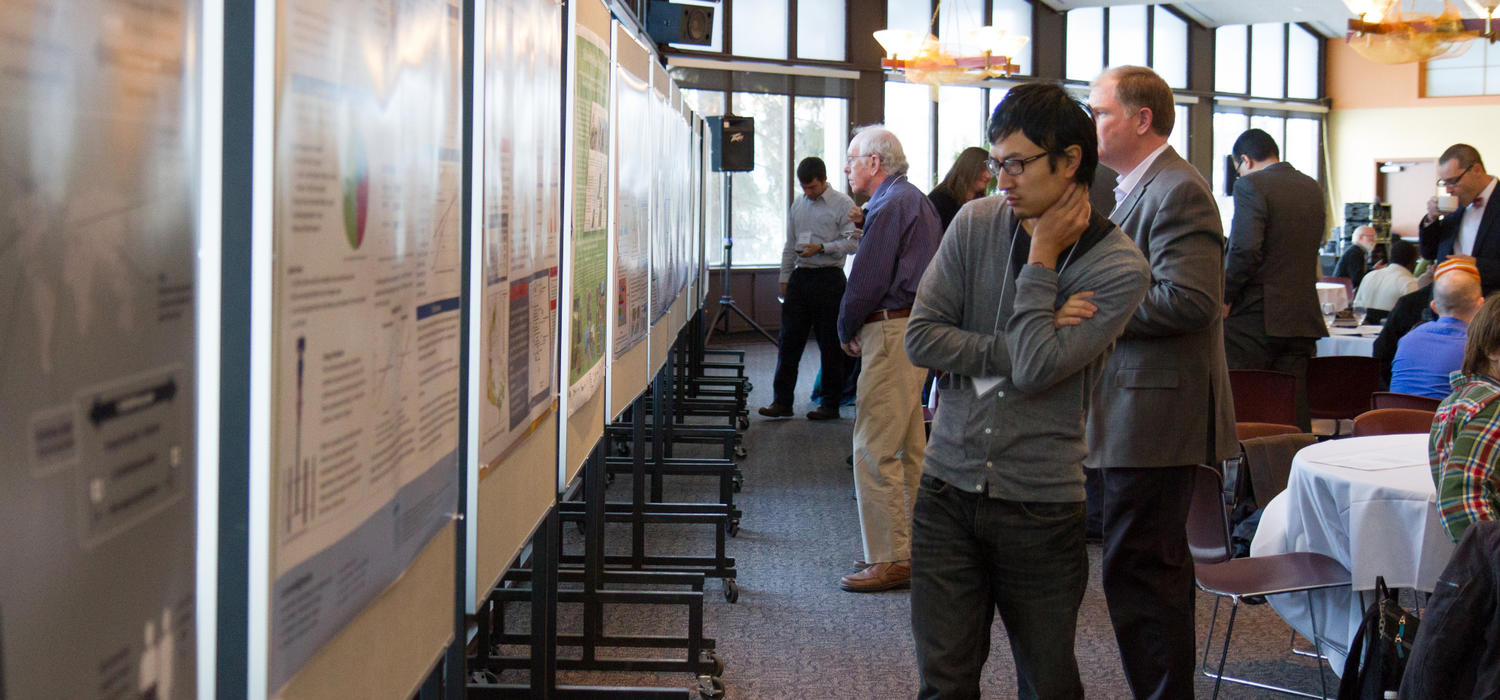
The audience heard from panelists representing a variety of industries.
Riley Brandt
Dec. 10, 2013

Transforming North America’s energy system to 100-per-cent clean renewable energy is feasible and would produce health, economic and environmental benefits, says Stanford University professor Mark Jacobson.
But it won’t happen without a big change in people’s values along with community and government leadership including new policies, he and other speakers told an Urban Alliance Thought Leaders Forum, “Transitioning to 100% Renewable Energy,” held at the University of Calgary.
One of four “Grand Challenges” in the U of C’s new Energy Research Strategy is “Toward low-carbon energy,” which includes research on renewable energies and design of low-carbon communities.
The Faculty of Science also has identified “Toward low-carbon energy” as a faculty research priority.
Last Friday’s all-day forum – sponsored by the Vice-President (Research) office, the faculties of Science, Social Work, Arts, Environmental Design, and the Van Horne Institute, and supported by a grant from the Social Science and Humanities Research Council – attracted more than 100 participants.
Lead organizer Mishka Lysack, University of Calgary associate professor of social work, chaired the event, which featured panels representing academia, business, government and non-governmental organizations. Forum participants engaged the panelists and each other in exchanging ideas and urging action.
Research by scientists at Stanford University, University of California Davis and Cornell University working on The Solutions Project shows that shifting from fossil fuels to 100-per-cent “wind, water and solar” by the mid-century is scientifically and economically feasible, Jacobson said in a video link.
“You do need policies in place to speed up this transition,” Jacobson said.
However, “the person in the mirror is the biggest problem,” said John McKay, federal Liberal environment critic – a major theme underscored by many panelists.
To become a more sustainable society, “we’ve got to start addressing our consumption,” and changing the way we solve problems and make decisions as communities, said Bob Dixson, mayor of Greensburg, Kansas, the “greenest city in North America.”
That change starts with realizing that we’ve “created this culture of individualism by design,” and put in place policies that promote wasteful consumption and rampant consumerism, said Byron Miller, U of C associate professor of geography and director of the interdisciplinary urban studies program.

The audience heard from panelists representing a variety of industries.
Riley Brandt
Brit Samborsky, senior energy engineer with the City of Calgary, noted that the city has made strides in using renewable energy. Calgary runs its LRT system on 100-per-cent wind-generated energy, and all of the city’s corporate energy needs are met by renewable sources.
At the provincial level, the Alberta government has been working on a renewable energy “framework,” now expected to be released early next year.
But David Kelly of SkyFire Energy, an Alberta-based solar energy company, said Alberta lags far behind some other jurisdictions in the world.
“We have the dirtiest electricity in Canada,” said Kelly, who noted that most of Alberta’s electricity is still generated by burning coal with impacts that cost $300 million per year in health care.
Ben Thibault, legal and policy analyst at the Pembina Institute, said Calgary and other municipalities have the authority to require that new houses be designed and built to incorporate solar electricity systems.
Bob Hawkesworth, former city council member and former Alberta MLA who’s now CEO of Hawkesworth Strategies and “energy excellence ambassador” for energy consulting firm 360 Energy Inc., said there needs to be a “constituency” to act on the issue. He started a signup list for people interested in follow-up action and gathered more than 40 names.
Noel Keough, assistant professor of urban design in the U of C’s Faculty of Environmental Design, urged citizens to get involved through initiatives such as Imagine Calgary, Sustainable Calgary, and CivicCamp.
Sustainability, Greensburg Mayor Dixson said, starts with getting out of our shuttered homes and high-fenced backyards and connecting with each other: “We need to get back to where we’re front-porch people.”